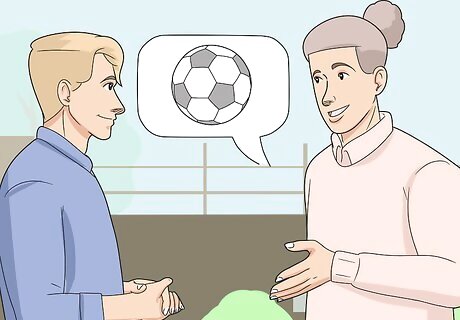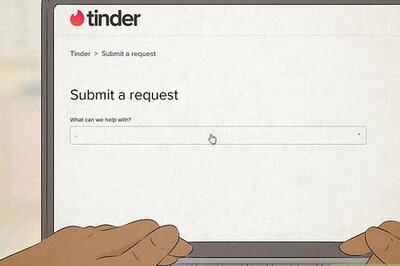
views
Reaching Out

Make the first move to open the lines of communication. If you feel comfortable, talk to them in person. However, you can also contact them online or via text message. Tell them “hello” and ask how they’ve been doing. You might say, “Hey! How’s school going?” or “Hi! It’s been a long time since we’ve talked. I was wondering how you’ve been.”Variation: If you and your enemy have a mutual friend, it’s okay to ask them to be a buffer as you try to initiate contact. Invite both your enemy and the mutual friend to do something together.

Invite them to meet you in a neutral location. They’re probably going to be surprised that you’re reaching out to them since you've been enemies in the past. That means they may feel nervous about meeting up with you. Pick a place where neither of you have strong ties so that you can both feel like equals. For example, you might ask them to meet with you at a local coffee house that just opened. However, it might be best to avoid asking them to meet you at your lunch table or at your home. Say, “Want to grab a cup of coffee at Good Beans?” or “I’m going to feed the ducks at the park. Wanna come?”

Give them a reason to see you as a friend. At first, they might be suspicious about why you’re reaching out to them. Think about how you’d feel if they suddenly started talking to you. Let them know that you want to make up. Additionally, show them you’re interested in a real friendship by telling them why you’re reaching out. You could say, “I know things have been rocky between us, but I don’t like that. I’d much rather us be friends,” or “We’ve had some conflicts in the past, but I think we have a lot in common. Maybe we could try being friends.”

Look for common ground that you can use to build a friendship. While you and your enemy may have differences, you likely have some things in common. Talk to them to learn more about them. Then, find common interests that unite you. For example, you might both enjoy playing soccer, you may both like being creative, or you might both like the same TV show.Tip: Sometimes the thing you have in common can be what’s made you enemies. For instance, maybe you’re both into playing tennis and are really competitive with each other. Instead of being enemies, you could try to help each other be your best.

Make friends with your enemy’s friend group. Having mutual friends will help you and your enemy become better friends. Reach out to their friend group and invite them to do a group activity. You can do this before or after you reach out to your enemy to open the lines of communication. For instance, you might host a game night at your home, or you could make plans to see a movie as a group.
Repairing the Relationship

Talk to them about how their past actions made you feel. There’s probably a reason why this person is an enemy. Consider what they did that pushed you away from them and how it made you feel. Then, remind them what happened and how it affected you. You might say, “I know that you made up that embarrassing nickname that everyone calls me. It really hurt my feelings that you did that.”

Apologize for your actions that hurt them. While you might not be the main aggressor in this situation, you’ve likely made some mistakes in the past. Take responsibility for your actions and tell them that you’re sorry. This will help you both move on. You could say, “I know that I hurt your feelings, and I’m really sorry about that. I hope you can forgive me,” or “I know you’re mad that I dated your ex, and I totally understand that. I’m really sorry for hurting your feelings.”

Forgive them for the things they did in the past. They may have really hurt you in the past, but hanging onto that pain will prevent you from being friends. Letting go of your pain and anger will help you move on, so forgive them for what happened. Acknowledge how you feel, then make a conscious decision to stop carrying that pain around. You can choose whether or not you want to tell them you forgive them. Telling them you forgive them can go a long way toward forming a friendship. Say, “I appreciate what you said. I forgive you for what happened.”Tip: Forgiving someone doesn’t mean that what they did was okay. It just means that you aren’t going to carry around the weight of that pain anymore.

Look for the best in them instead of focusing on their faults. Everyone has good qualities and bad qualities. If you only look at a person’s bad qualities, it’s easy to think of them as an enemy. Try seeing this person in a more positive light by picking out their best qualities. For instance, you might recognize that they’re outspoken, they’re good at listening, and they’re kind to animals.

Assign positive motives to their actions when you’re feeling upset. It’s likely that they’re going to do things that irritate you sometimes. It’s easy to assume they’re doing these things on purpose, but they probably aren’t. Instead of getting upset, try to think of positive or neutral reasons why they might make these choices. For instance, let’s say both of you signed up for the same volunteer position and you find out that they talked to the person in charge to increase their chances of getting it. That might make you feel like they went behind your back. However, you could choose to believe that they had no intention to hurt you and just really care about the job.
Building Your Friendship

Maintain regular communication with them. You’ll need to communicate with them in order to grow your friendship. Talk to them in person regularly, and keep in touch via text or messaging. Try to check in with them at least a few times a week if not daily. For instance, you might talk to them every day at work or school. Additionally, you might send each other memes back and forth.

Listen to them when they’re talking. People are more likely to want to be friends with you if they feel like you really listen to them. Make sure that you’re focused on what this person is saying rather than thinking about your response. Additionally, nod your head and say things like, “uh-huh” to let them know you’re listening. Try to repeat back what they said to you. You might say, “Wow, it sounds like work is really stressful right now.” Ask them follow-up questions so they know you’ve been listening. You might ask, “Did you ever figure out what happened?” or “What are you going to do now?” Try to bring a non-judgmental attitude to the conversation. Make sure the person knows that you're there to listen and be supportive.

Open up to them a little bit at a time to slowly build trust. True friendship requires intimacy, but you don’t need to rush to bare your soul to them. It’s okay to take your time and slowly reveal details about yourself. Give them a little information at a time, and eventually you’ll have a good friendship. For instance, you might start by telling them about a goal you’re pursuing. Then, you might reveal a few of your interests that only your friends know about. After you’ve been friends awhile, you might feel comfortable talking about your secrets or personal problems. Similarly, don't pressure someone else to open up to you about their past. Build a strong relationship first; when the time is right, they'll start to open up.Tip: You might feel nervous about opening up to this person because they’ve been your enemy in the past. That’s totally okay! Take things slow and don’t tell them anything you don’t feel comfortable with them knowing.

Invite them to do things you both enjoy. Spending time together will help you solidify your friendship. Look for things that both of you will enjoy, then invite them to join you. This will help you both have fun with each other. For example, you might invite them to go watch your favorite sport together, or you could ask them to join you for a horror movie fest if you both like scary movies. Use your common interests to help you pick good activities.

Set boundaries so that you both know what to expect. It’s best to take things slow so that neither of you gets your feelings hurt. Having good boundaries can help you do that. Consider what caused you to become enemies in the first place, then figure out how you can prevent that from happening again. Additionally, identify ways you can prevent your friendship from moving too fast. For example, let’s say you and your former enemy used to get really competitive with each other. You might set a boundary that you won’t trash talk each other. Similarly, you may be worried that you’re going to share too much information too fast. To prevent this, you both might agree to start your friendship with group hangouts instead of one-on-one activities.




















Comments
0 comment